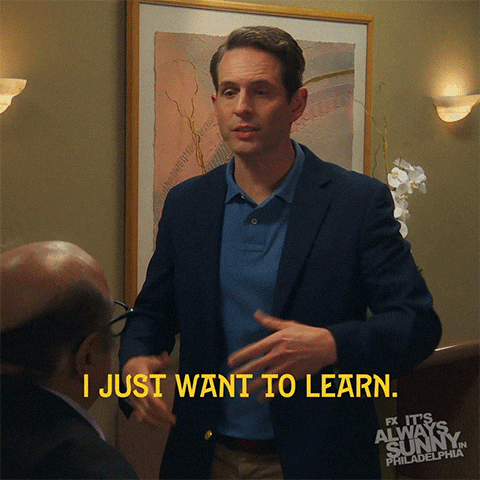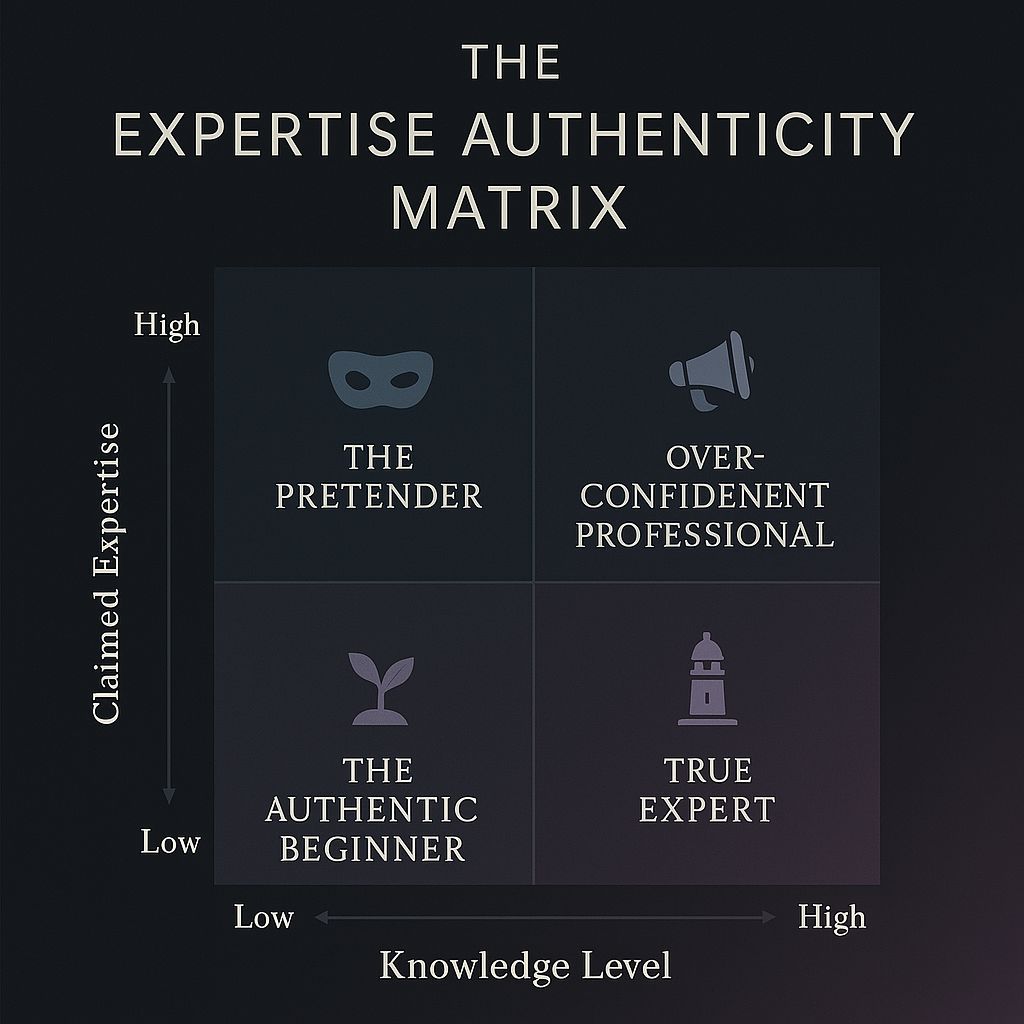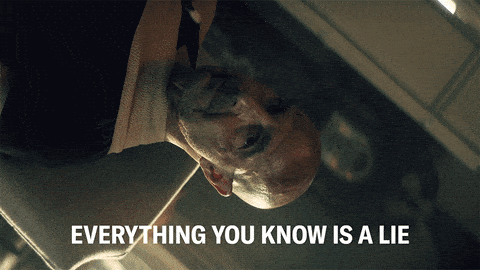The most dangerous meeting room isn't the one where nobody knows the answer.
It's the one where nobody admits it.
I've been tracking a pattern across industries—a collective theater where careers advance based not on what you know, but on how convincingly you pretend to know.
The most accomplished people I've studied share a counterintuitive trait: They say "I don't know" more often than their peers.
Not because they know less. But because they understand what knowledge actually is.
While we worship certainty, they worship questions. While we avoid exposure, they invite it. While we perform expertise, they pursue it.
And the gap between performers and pursuers isn't just philosophical. It's the difference between those who plateau and those who transform.

KEY INSIGHTS ✨
The most dangerous person isn't the expert—it's the beginner pretending to be one
Real mastery requires embracing the vulnerability of not knowing
Social media sells the illusion of expertise without the journey of acquisition
True growth begins precisely when you admit where you truly are
THE PARADOX OF PRETENDING 🎪
Everyone's talking about becoming an expert.
Nobody's talking about the cost of pretending to be one.
There’s troubling pattern in our professional culture—a collective performance where we're all playing experts while secretly terrified of being exposed as learners.
This isn't just happening in boardrooms and LinkedIn profiles.
It's happening in our minds. It's happening in our growth. It's happening in the quiet moments when we choose safety over learning.
The greatest tragedy isn't that we lack knowledge. It's that our fear of appearing unknowledgeable prevents us from acquiring it.
This isn't just a professional challenge—it's an existential one. And it's costing us more than we realise.
In the beginner's mind there are many possibilities, in the expert's mind there are few.
THE EXPERTISE ILLUSION 🔍
What's truly harmful in professional spaces isn't expertise itself. It's the beginner pretending to be an expert.
We've created a culture where admitting you're learning has become more terrifying than failing while faking. The social cost of saying "I don't know" exceeds the personal cost of never truly knowing.
This is our modern paradox: Everyone wants the outcome of mastery. No one wants the process of mastery.

So we've normalised pretending—a mass delusion where we're all experts and none of us are growing.
Think about this contradiction:
Real experts say "I don't know" often
Novices speak with absolute certainty
Masters remain students
Amateurs claim mastery
The more you know, the more you know you don't know.
But acknowledging what you don't know requires a security that many of us haven't cultivated.
It requires us to value growth over image. Progress over perception. Reality over illusion.
And that's where most of us falter.
THE TRUE COST OF FAKING IT 💸
What social media really sells isn't connection or information.
It's the illusion of expertise.
The ability to skip the learning curve. The permission to claim mastery without mileage.
And we're all buying.
But the true cost of faking expertise is far greater than we realise:
1. You stop asking questions
When you're protecting an image, curiosity becomes threatening. Each question feels like a potential exposure rather than a path to understanding.
2. You avoid challenges
Growth requires discomfort, but discomfort threatens the facade. You begin selecting opportunities based not on growth potential but on risk of exposure.
3. You fear exposure
Every conversation becomes a defence rather than an exploration. You listen not to understand but to prepare your next statement of knowledge.
4. You miss breakthroughs
Insights emerge from acknowledging gaps, not from pretending they don't exist. Your blind spots remain permanent rather than temporary.
Pretending to know is the surest way to ensure you never actually learn.
It's a psychological prison with no windows—and we build it ourselves.

The illiterate of the 21st century will not be those who cannot read and write, but those who cannot learn, unlearn, and relearn.
THE EXPERTISE THEATRE CYCLE ⚙️

This cycle doesn't just limit individual growth—it creates entire cultures of stagnation disguised as sophistication.
THE MASTERS' SECRET 🗝️
Look at history's genuine masters:
Einstein published his greatest work as a patent clerk
Michelangelo was still taking anatomy lessons in his 60s
Feynman said "I think I can safely say nobody understands quantum mechanics"
Their greatness didn't come from claiming expertise. It came from pursuing questions.
Expertise comes from curiosity, not from certainty.
The greatest experts maintain a beginner's mind even as they develop advanced skill. They embrace complexity instead of oversimplifying. They seek correction rather than confirmation.
True expertise isn't about knowing everything. It's about maintaining the humility to keep learning anything.
The masters understand something most of us miss: Knowledge isn't static—it's dynamic. It isn't accumulated—it's cultivated. It doesn't end—it evolves.
And that evolution requires constant questioning.
The more I learn, the more I realise how much I don't know.

REFLECTION 🧠
Consider a moment when you pretended to know something you didn't:
What were you protecting?
What might you have gained by admitting your uncertainty?
How did this performance affect your subsequent learning in this area?
ESCAPING EXPERTISE THEATRE 🎭
To escape from this expertise theatre, consider doing this:
1. EMBRACE BEGINNER STATUS 🌱
The first step isn't learning more—it's acknowledging where you are.
Lead with questions, not answers
Announce your learning stage
Document growth publicly
This isn't about false modesty. It's about creating space for authentic growth.
When you publicly identify as a learner, you give yourself permission to make mistakes. You create an expectation of progress rather than perfection. You align your internal experience with your external presentation.
And that alignment creates power.
2. SEEK COMPLEXITY 🧩
The expert mind simplifies without oversimplifying. It doesn't avoid complexity—it navigates it.
Actively look for what you don't understand
Pursue fields that humble you
Follow your confusion
When you feel completely out of your depth, you're exactly where growth happens.
The most valuable insights exist at the edge of your understanding—not comfortably within it. By deliberately positioning yourself at this edge, you create the conditions for breakthrough.
And breakthroughs come from broken understanding.

3. CREATE LEARNING FEEDBACK LOOPS ⚡️
Growth isn't linear—it's iterative. Each cycle builds on the last.
Share partial understanding
Invite correction
Normalise iteration
By making your learning visible, you create accountability for growth while liberating others to do the same.
This isn't just about individual progress—it's about cultural transformation. Each time you publicly iterate on your understanding, you create permission for everyone around you to do the same.
And that's how cultures change.
THE EXPERTISE AUTHENTICITY MATRIX 📊

Most of us oscillate between these quadrants depending on context. The goal isn't to always be in the "True Expert" quadrant—it's to align your claimed expertise with your actual knowledge, or ideally, to maintain the humility of claiming less than you know.
REFLECTION 🧠
Identify one area where you've become comfortable saying "I don't know":
How did you develop this comfort?
What benefits have you experienced from this authenticity?
How might you expand this comfort to other areas of your life?
THE PATH FORWARD 🗺️
The burden of expertise isn't in acquiring it. It's in pretending you already have it.
Real growth happens when you're willing to say: "I don't know—yet." "I'm still figuring this out." "I might be wrong."
That's not weakness. That's the path.
The greatest experts are eternal beginners. The greatest beginners are future experts.
The space between is filled with people too afraid to admit they're learning.
Which side of history will you stand on?
The answer to that question determines not just what you'll know— but who you'll become.
The fool thinks himself to be wise, but the wise man knows himself to be a fool.

THIS WEEK'S CHALLENGE 🏆
Choose one area where you've been performing expertise rather than pursuing it. Publicly declare yourself a learner in that field and document three specific questions you're exploring.
For transparency, I'll go first:
I'm declaring myself a beginner in AI Agent building and automation. Despite exposure of tech, product, and innovation, I've been reluctant to admit how much I don't understand about this rapidly evolving field.
Questions I'm currently exploring:
How do we design AI agents that augment human capabilities?
What are the fundamental principles that separate truly useful automation?
Where is the balance between current capabilities versus future potential?
The more I position myself as a learner, the more experts have emerged to guide me.
Learning is the only sustainable competitive advantage.
Let's build it together.
Until next week,
love,
aayush
hustle peacefully!

